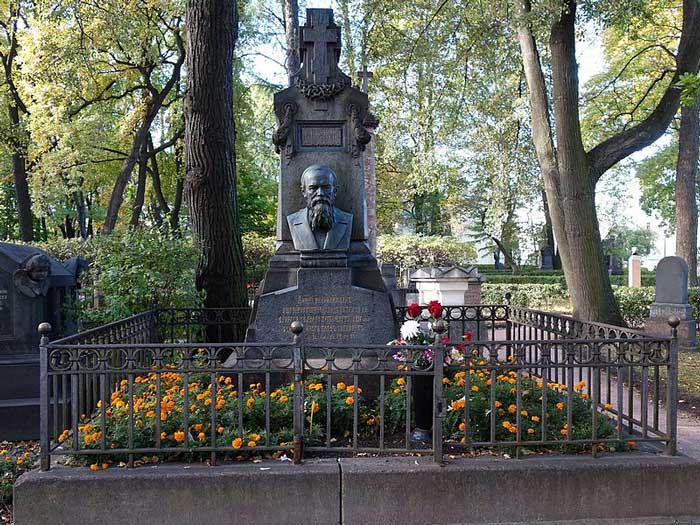
On the gloomy 11th November of 1821, Fyodor Dostoevsky was born in a Moscow hospital for the poor, where his father Mikhail was working as a doctor, after his retirement as a military surgeon. While his father was a stern and rigid man, his mother, Maria was kind and indulgent. Before being sent to a day school and then to a boarding school, Fyodor was educated at home till 1833. In his childhood, he was introduced to the fairy tales, heroic sagas and legends by his nanny, Alena Frolovna. She was, in fact, an influential figure in his upbringing and love for fictional stories. His mother also used the Bible to teach him to read and write. Gradually, he was introduced to a wide range of literature by his parents. Later, he acknowledged that, that his imagination was brought alive by the nightly readings by his parents.
On 27 September 1837 his mother died of tuberculosis and suddenly in 1839, his father died, probably murdered by his own serfs. During those days Fyodor was studying Military Engineering, as directed by his father. But he hated a career as a military engineer, primarily because of his lack of interest in science, mathematics and his preference for drawing and architecture. Yet, he continued his studies, passed his exams and obtained the rank of engineer cadet. However, he was evidently unsuited for such an occupation and soon after accepting the job of a lieutenant engineer on 12 August 1843, he resigned his commission to commence an uncertain career as a writer.
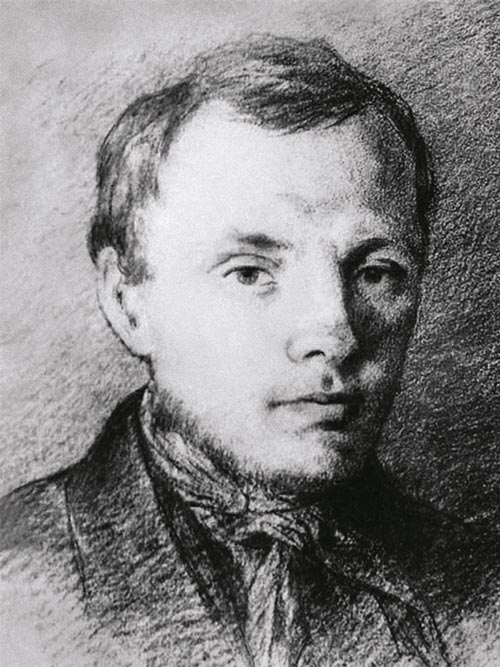
The first literary work of Dostoevsky, a translation of Balzac’s ‘Eugenie Grandet’ was published in June and July 1843 in a journal. After that, with the release of his first novel ‘ Bednyye lyudi’ (Poor Folk) on 15 January 1846, he was hailed as the great new talent of Russian literature and became a commercial success. During the next few years, he published his second novel, ‘The Double’ (1846), a study in schizophrenia and a number of stories, including ‘White Nights’, which depicts the mentality of a dreamer.
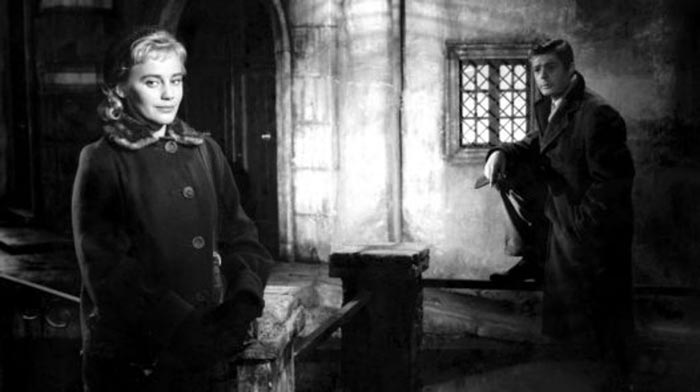
But, as these works were not commercially successful, it left Fyodor in financial trouble. To face the troubled water, he joined the Utopian Socialist Betekov Circle, a tightly knit community which helped him to survive. When the circle dissolved, Dostoevsky joined the Petrashevsky Circle, which had proposed social reforms in Russia. Probably, he was not quite aware that, it was actually a group of revolutionary minded young people who were secretly preparing a coup in Russia. Dostoevsky occasionally participated in their discussions on freedom from censorship and the abolition of serfdom to take the opportunity to use the circle's library on Saturdays and Sundays.
However, on April 23, 1849, he and the other members of the Petrashevsky Circle were arrested at the instance of Tsar Nicolas I, who apprehended a revolution. The prisoners were sent to the well-defended Peter and Paul Fortress, which was used to house the most dangerous convicts. They spent eight months in prison till 22 December, when without any warning, the prisoners were led to the Semyonovsky Square. At the square, a sentence of death by firing squad was pronounced to the prisoners, the regular last rites were offered to them, and three prisoners were led out to be shot first. Dostoevsky was the in the second row. Nevertheless, execution was stayed at the last possible moment, when a cart delivered a letter from the Tsar sparing their lives. Actually, it was a mock-execution ceremony, which was a part of the punishment and as a result of that, one of the prisoners went permanently insane on the spot and another went on to write 'Crime and Punishment'.
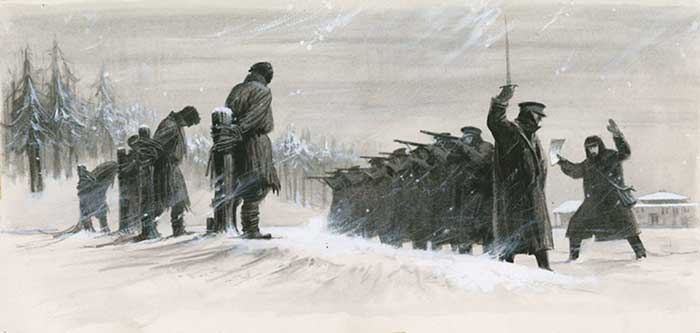
After the mock-execution, Dostoevsky was sentenced to four years in a Siberian prison labour camp. In the camp, he was classified as one of the most dangerous convicts and he had his hands and feet shackled until his release. With only one washroom for more than 200 inmates, the overall condition of the camp was pathetic. Dostoevsky suffered his first attacks of epilepsy while in prison. In addition to that, in the camp he had piles and trembling fever every night. In Siberia he experienced the regeneration of his convictions. He was released on 14 February 1854 and was forced to serve in the Siberian Army Corps of the Seventh Line Battalion in Semipalatinsk, ‘The House of the Dead’, based on his experience in prison and the first published novel about Russian prisons, was published in 1861 in the Journal Vremya. In Semipalatinsk, Dostoevsky came into contact with some upper-class families. There he met Alexander Ivanovich Isaev and his wife, Maria Dmitrievna Isaeva.

Maria Isaeva, a beautiful, passionate blonde, had a miserable conjugal life, as her husband was an alcoholic. Dostoevsky started to frequent their home, and in no time he was burning with love for Maria. But, within a short time, the couple left the place, as the husband was transferred to work in another town. Within a few days, the alcoholic husband died, but Maria informed Dostoevsky that, she was to marry another man. The news was almost a fatal blow for Fyodor. He had an epileptic attack and then wrote to Maria that he would die if she left him. She did not leave him and on 6th February 1857, Dostoevsky married her at the age of thirty six, in the Odigitrievsky church of Kuznetsk. He was reported to have been very kind to Maria and even took the responsibility for her son from the previous marriage.
This belated first love was not as simple as Dostoevsky had expected. It was Maria, who initially rejected his proposal, clearly stating that they were not meant for each other and that his poor financial situation precluded marriage. The marriage, which started with a seizure, was destined to be unhappy. From the very beginning their family life was unhappy and she found it difficult to cope with his seizures. Though both spouses were very nervous and touchy, the two could never settle into a harmonious marriage. Soon, Isaeva started to taunt and torment him with letters, expressing her intention to marry some other wealthy official. However, Dostoevsky took on a role more like a friend or brother to Isaeva, rather than a husband. In fact, probably he loved Isaeva for all those feelings and generated excitement in him. They were connected by common sufferings, rather than fondness and they lived together till Maria’s death of tuberculosis in 1864. Later, Dostoevsky confessed that, she was the most sincere, big-hearted, and generous woman in his life, though he was not equally honest with her. Maria Isaeva was to base the character of Natasha in his ‘ Humiliated and Insulted (1861). Like Isaeva, Natasha was also prone to tormenting her lovers.

According to his contemporaries, Dostoevsky was a man of insatiable sexuality. He had to satisfy his excruciating desires in local brothels. It is said that, the prostitutes who had met Dostoevsky once, refused to see him for the second time, as his fantasies and desires were too much to bear. He needed a woman who would be absolutely submissive and would adore him despite his weirdness. For his insatiable inclination toward sexual activities, Dostoevsky was frequently ridiculed by his friends. Even on one occasion, Turgenev compared him to Marquis de Sade.
Dostoevsky got involved into an affair with Apollinaria Suslova, while being married to Maria Isaeva. She was a thin, graceful twenty two year old beauty, with blue eyes and a thick mass of gorgeous red hair. They met at a public reading of his book in St. Petersburg. At forty two and two decades older than her, Dostoevsky found her to be a perfect, fresh and blossoming flower, which he could not pass by. Soon, he was pleased to find out that he was the first one to pick it up. Apollinaria was attractive, alluring and shared his literary taste and physical passion, but she turned out to be an eccentric, whimsical girl. Nevertheless, with her Fyodor climbed to the heights of passion, which he had not known before. He conducted a secret affair with Suslova, as he was married and unable to give her everything she wanted. He could not gather sufficient reasons to leave his dying wife and welcome Suslova in his life. He was continuously torn by internal contradictions and was living in two worlds of torturing himself and torturing the others.

Finally, they decided to take a secret trip abroad. As decided, Apollinaria left first, to be followed by Fyodor. But, when he joined her, Apollinaria said that she had fallen in love with another man. Despite his best efforts for quite a long time, Dostoyevsky failed to conquer her back. After their separation he tried to dull his pain in the arms of another charming girl, a twenty-year-old Anna Korvin-Krukovskaya. But, he could never forget Appolinaria Suslova. Though his gambling combined with her flirtations with another man ultimately led to the demise of their relationship, he was always devoted to that seductive, cruel, unfaithful and tragic love.
They met again after two years, but Fyodor could not find his old Apollinaria in her. She had lost her old warmth and became cold and at the same time, haughty. Even, she did not care to hide her undisguised contempt, during the moments of intimacy. It was then when he lost a whole fortune at roulette in Baden-Baden. Suslova’s impact on Dostoevsky can be felt through many of his novels. Polina, the protagonist in ‘ The Gambler’, was based on Suslova.
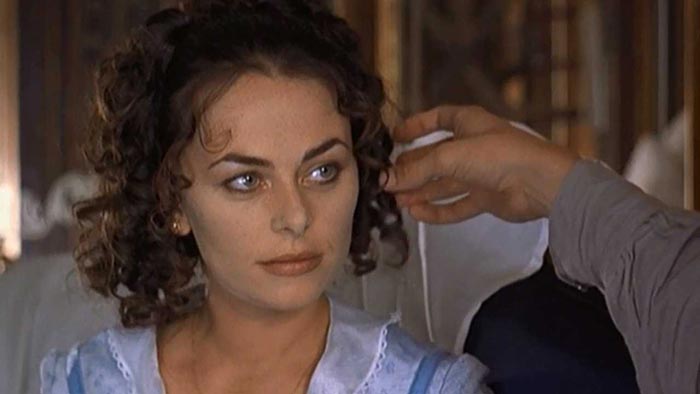
Though he was in a terrible state of mind after the devastating affair with Apollinaria, Dostoevsky had to return to work. He was regularly hounded by the creditors and his wallet was empty. He promised his editor, Feodor Stellovsky to complete a short novel focused on gambling addiction, though he was yet to write a single line of it. To make a quick progress in his writing, he was advised by one of his friends to hire a secretary. Accordingly, Dostoevsky contacted a stenographer, who in his turn recommended his pupil, the twenty-year-old Anna Grigorryvna Snitkina. Thus, a charming Anna, who had been dreaming about getting to know the famous writer, appeared in his home and a new chapter started in the life of Dostoevsky.
Anna entered Dostoevsky's apartment house as a complete stranger. As a young girl she was an avid reader of his novels. She used to read them in secret, without the knowledge of others, cloistered in the bushes outside their home, until they were snatched away by her older sister. She was in awe of the eminent writer, and at first he was also equally uncomfortable in front of her. He must complete ‘The Gambler’ as soon as possible, in order to pay off debts left him by the death of his brother, and to make a quick progress, he has decided to dictate the novel rather than writing it himself. For two days he could do nothing and remained almost mute, trying to get adjusted to the new style of operation. But, within a week he became at ease with Anna and each night she tallied the number of pages they have completed and gleefully reports the progress.

Within a couple of weeks they got to know each other really close. At first, Fyodor only saw an untiring assistant in her, but soon he realized that she had become a lot more. The difference in their age was striking, yet little by little Dostoevsky found himself being unable to live without this woman. The process of completing the novel engrossed both of them so much that they could not imagine life without each other. They got married in February of 1867.
Young and inexperienced Anna accepted her husband with all his weird sexual habits and tried to take them for granted. They were happy, but not the writer’s relatives, who started badgering and harassing the girl. As Anna realized that these confrontations could break their marriage, she suggested a trip abroad for a couple of months. Finally, the couple left Russia, and ended up spending four years in Europe, which allowed them to escape Russia’s oppressive atmosphere and try to build a family. They lived in Germany, Switzerland and Italy. During that time, they buried their first newborn daughter, and gave birth to another girl, Lubov (means ‘love’).
They nurtured their love, they tried to get used to living together and tried to build their relationship little by little. The process was not very smooth, they had many quarrels, but gradually they learned to respect and treasure each other. He was painfully jealous and Anna learned to exploit his jealousy to bind him closer. As usual, Dostoevsky regularly kissed the hands of other women upon being introduced to him, but if anyone kissed Anna’s hand, he would become bitter for the rest of the evening, and sarcastically encourage her to return the attentions of her young admirer. Finally, she would berate him for being absurd and he would fall to his knees begging forgiveness for his suspicions.

On one occasion, Anna left a letter on her husband's desk, wherein an unknown person informed him that, his wife had taken a lover. The letter was signed by ‘a well-wisher.’ Dostoevsky almost choked when he read it and started to act crazily, till she explained that it was nothing but a practical joke on her part to test his trust in her. As usual, he appealed for her pardon, her acceptance of his apologies, and a blissful reunion.
Anna Snitkina was wise enough to accept Dostoevsky as he was and never attempted to change him, which made this marriage the happiest and most harmonious in the writer’s turbulent life. She was aware of Fyodor’s tremendous passion for gambling. She observed that, he lacked the necessary composure to execute it successfully. She knew that any attempt to condemn his mania would be useless. Instead, she used it to her own advantage. Whenever he was tense, distraught, or ill-humored, she would encourage him to go to the casino. Invariably, he would return, unhappy with his losses, emotionally drained and much easier to deal with. Anna always forgave and supported him whatever he did. Back in St. Petersburg, she gave him a gift of two sons. Leo Tolstoy once remarked that, many Russian writers would feel lucky, if they had wives like Anna.
Anna created a peaceful environment for him in their home, it helped Dostoevsky and he stopped having epilepsy attacks. He became calm. Unfortunately, he was not destined to live a long life. In January of 1881, he fell ill. One morning, he called for Anna and told her to remember he always loved her as much as he could and that he never cheated on her, not even in his thoughts. By the evening of that day, he passed away.
